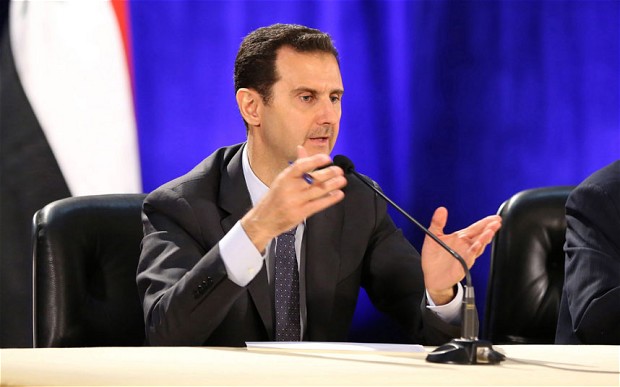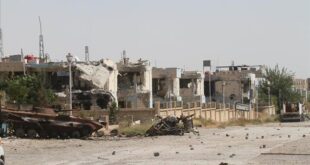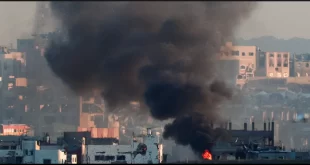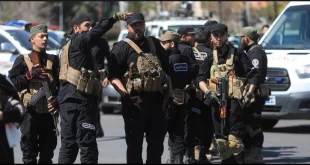
People in Syria see their country as being threatened by foreign powers, who are sponsoring the jihadist groups fighting President Assad Photo: EPA
Apr 17, 2014, the Telegraph
It was a simple three-hour trip from Beirut to Damascus. The border crossing caused no problems, and thereafter the journey was interrupted by only a handful of checkpoints. My first impression of the Syrian capital, too, was that it is surprisingly safe. I saw no armed men on the streets during the journey to my hotel, and in the city centre life appeared to be continuing as normal. Residents even claimed that President Assad often drives himself to his office from the relatively modest flat where he lives, and can sometimes be seen stuck in the rush-hour traffic. When I had lunch at a restaurant with a government minister, there was no visible security at all.
But after only a few hours in this city, it becomes clear that Damascus is not normal in the slightest. Several of its suburbs are held by rebel fighters, who pound government-held areas with mortars. These do not have the range to reach the city centre, but most people live under the shadow of constant attack. It is as if the residents of Clapham had conceived a desire to annihilate Wimbledon and Brixton, and Islington had declared war on Camden Town.
As with the Blitz, these attacks appear completely random. Many of the shells land harmlessly, or do not explode. Others cause mayhem. On Tuesday, one struck a school in Bab Touma (St Thomas’s Gate), killing one child and wounding roughly 40. And over the past few days the volume of the bombardment has escalated sharply. An accountant who lives in the affluent suburb of Jaramana told me that his area had been hit almost 15 times before breakfast that morning.
On Palm Sunday, I went to the Old City and walked up Straight Street, following the route taken by St Paul after he had been blinded (Kokab, the scene of his Damascene conversion, is now in rebel hands). At the Greek Catholic church, I watched ceremonies of breathtaking beauty – in precincts that had been struck twice in the past week, though happily causing no injuries. On the way back, I passed a man looking dazed next to his ruined car. A mortar had struck it just a few minutes earlier. When I picked up the shell casing, it was still warm.
Over the past few days, I have talked to shopkeepers, students, soldiers, doctors, a dentist, MPs and government ministers (including the minister for tourism, who must have the most thankless job in the world). On the basis of these conversations, I would judge not just that support for the regime is holding up, but that President Assad could very well win a popular election, even if carried out on a free and fair basis. Such elections are in fact due: the president must hold a poll before July 17 if he is not to exceed his constitutional term of office. An announcement is expected soon.
Discussing this vote, I found – to my surprise – that even people outside the governing Ba’ath party, including some of Assad’s political opponents, said they would support him. Maria Saadah, an independent MP for Damascus, told me that her career as an architect had suffered because she did not belong to the Ba’ath, and that she had entered politics at the beginning of the crisis because she wanted to reform the system. But she added that the middle of a war against what she described as foreign-backed insurgents – which is how the regime ceaselessly depicts its opponents – was not the time for that. Syrian sovereignty, she said, had to come first.
This argument is very common. People here see their country as being threatened by foreign powers (above all Saudi Arabia, Qatar and Turkey, all backed by the West) who are sponsoring the jihadist groups that make up the opposition. I was struck by the fact that this argument is not made only by the Alawite coterie around the president. I also heard it from Sunni Muslims, Christians and members of the various other cultural and religious groups that abound in Syria.
How can this square with the Western narrative that President Assad’s government, with the aid of a handful of tribal followers, is hell-bent on the destruction of the rest of the country? Consider the facts. Only a handful of members of Assad’s 30-strong cabinet (I was told two) are Alawite. The prime minister is Sunni, as are the interior minister, the justice minister, the foreign minister, even the defence minister. The delegation that travelled to Geneva for the failed peace talks several months ago was also almost entirely composed of Sunni Muslims (though they would probably reject sectarian terms, and prefer to think of themselves just as Syrians).
Nor is it merely the political class that thinks in this way. Last night I had dinner with a young doctor. He showed me a Facebook exchange that he had recently had with a former friend from medical school, who has joined the extremist opposition group al-Nusra. The doctor had put out a public status aimed at all jihadists asking them: “Please stop shooting at us with your mortars.” He was astonished to receive a reply from his friend: “I will put a bullet in your heads.” My doctor friend messaged him back: “I am not afraid of you.” This was followed by a horrifying response. “We love death, we drink blood. Our president is dead bodies. Wait for our exploding cars to kill you.”
There the matter rests for the time being. When I asked whether the doctor was afraid, he shrugged his shoulders and told me: “Of course he can come and kill me any time, just by putting a package in front of my door, or asking someone to come and shoot me.”
When I was in Bab Touma, I was approached by a shopkeeper, who insisted on taking me to his antiques shop. There, he served me tea and told me without rancour that no customers came to visit any more, and there were no jobs.
He walked me along an alleyway to his home and pointed to a destroyed balcony where his mother had liked to sit. Two months ago, she had been resting there as usual when she was killed by a direct hit from a mortar. “Your government,” he told me, “is the worst ever; they want Syria to be a democracy and ally themselves with Saudi Arabia, which has nothing to do with democracy.”
I have only been in Damascus a few days and have been out of the city just once, on a government-sponsored trip to the ancient Christian village of Maaloula, claimed back this week from rebel forces. I have not spoken to the opposition (travel in rebel-held areas is impossibly hazardous: many journalists have been kidnapped). I have been accompanied for much of the time by a government minder. I am well aware that the government has committed dreadful atrocities, though I suspect that some of the accounts have been exaggerated.
Nevertheless, I do think the words of my shopkeeper friend are worth pondering. If the insurgents who killed his mother win the war, there will be no Christian churches in Syria any more (just as there aren’t in Saudi Arabia at the moment). Life will be similarly terrible for many of the ordinary Muslims who make up the great majority of the population.
There are no “good guys” in Syria’s civil war. But we should not be blind to the fact that there is a project out there to destroy its rich, pluralist and unbelievably intricate culture and replace it with a monochrome version of Wahhabi Islam, of the kind favoured by Saudi mullahs. And for reasons that history may come to judge very severely, Britain, the United States, and the West have been aiding and abetting this project.
 Syria Support Movement solidarity with the Syrian people
Syria Support Movement solidarity with the Syrian people




